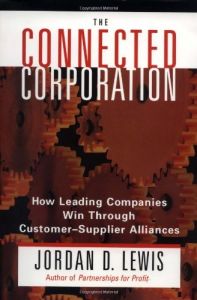
The Connected Corporation
How Leading Companies Win Through Customer-Supplier Alliances
Recommendation
Author Jordan D. Lewis uses the experiences of four major companies - Motorola, Philips Consumer Electronics Company, Marks & Spencer and Chrysler - to show the benefits of creating an alliance with your suppliers. The book, which is thorough and complete, if a bit long-winded, explains the benefits of such customer-supplier alliances, shows how to get started if you want to form a partnership and spells out how to maintain the relationship. The obligatory tables and figures are conveniently listed right after the table of contents. If you are in a huge rush, you can skip the book and just read the tables, because you will probably get a condensed version of the same information. But getAbstract thinks you’ll enjoy reading how these four companies fumbled through the awkward initial stages of customer-supplier alliances and then emerged into trend-setting, money-making success.
Summary
About the Author
An international consultant, Jordan D. Lewis is also an author, expert on strategic alliances and former lecturer at the Wharton School of the University of Pennsylvania. Lewis is a fellow of the World Economic Forum.



















Comment on this summary